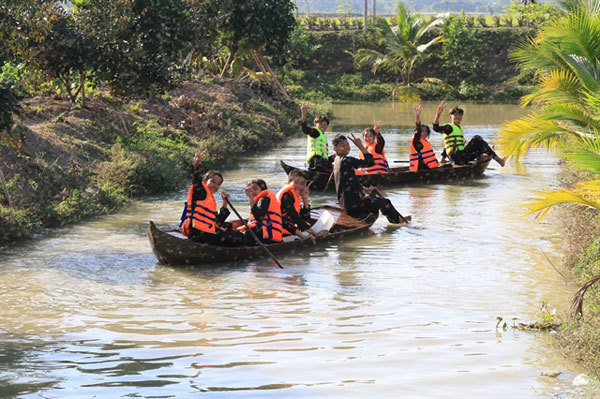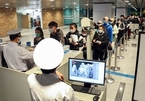 |
|
Tourists row boats at Tien Dinh agro-ecological tourist area at Phu Thuan A Commune in Dong Thap Province’s Hong Ngu District.
|
In a letter sent to then Prime Minister Nguyen Xuan Phuc proposing the Government to open the market in a safe and sustainable manner, the Tourism Advisory Council (TAB) stated there should be a roadmap. Accordingly, it is necessary to have policies requiring COVID-19 'vaccine passports' and testing tourists before flights and after arrival at tourist sites. Travel insurance, including medical insurance related to COVID-19, should be compulsory for all foreigners coming to Vietnam and Vietnamese tourists travelling abroad.
Vo Anh Tai, vice chairman of TAB and deputy director general of Saigontourist Group, said COVID-19-related insurance would ensure benefits and safety for both travellers, travel firms and local authorities in case of tour delays or cancellations.
The TAB suggested the Government and the Ministry of Finance to allow insurance companies in Vietnam to sell COVID-19 travel insurance products.
“Medical insurance programmes related to COVID-19 have been offered in some countries. It helps cover expenses on hospitalisation, examinations, treatment and medical care, and medical evacuation and repatriation,” Tai told Người lao động (The Labourer) newspaper.
He also said travel insurance can offset the cost if the trip is affected by the pandemic.
Hoang Nhan Chinh, Secretary General of TAB, said that the Law on Tourism required travel companies to buy insurance for tourists during the tours unless they already had insurance for the entire travel period. This insurance is paid to visitors when there are emergencies including illness and accident. However, he said, the tourism industry still did not have COVID-19 insurance, especially in the context of Vietnam considering opening the market to foreign visitors.
"COVID-19 related insurance will prove effective for visitors when they travel to a tourist destination that requires testing as they can pay first, then request the insurance agency to reimburse the cost,” he said.
In case the visitor was quarantined when travelling to a certain area due to an outbreak, the expense during the quarantine period was also covered by insurance, Chinh added.
Tourism is a key economic sector in Vietnam, contributing more than 10 per cent of the country’s GDP and generated over US$30 billion in annual revenue.
Results of a recent survey of Vietnamese tourists conducted by TAB about the willingness of tourists to purchase additional travel insurance packages during the high-risk disease period showed that 52 per cent of respondents answered 'Yes'. This reflected that they have a demand to purchase a COVID-19 insurance package.
Many businesses also believe that COVID-19-related insurance products are necessary as the tourism industry is implementing a roadmap to reopen to international visitors.
In fact, a few travel companies have been working with the insurance company to extend their terms of support to visitors in case of an unfortunate infection with the SARS-CoV-2 virus while on tour and within 14 days after the tour ends.
The Vietnam Travel and Marketing Transport Joint-stock Company (Vietravel) is an example. There is a provision on COVID-19 in the travel insurance policy for the company's customers to enhance the interests of customers, said Huynh Phan Phuong Hoang, Deputy General Director of Vietravel.
She said that the most important thing right now was the policy that allowed travel companies to coordinate with insurance companies to deploy COVID-19 insurance products as in other countries.
"A 'vaccine passport', a certificate showing a person is negative for COVID-19 at the time of departure and COVID-19-related insurance are prerequisites for welcoming back foreign visitors and rapidly reviving the tourism industry," Hoang said.
At the Government's regular press conference held in late March, former Minister and Chairman of the Government Office Mai Tien Dung said that some key tasks are to speed up research, development and testing of vaccines, as well as developing a plan to import vaccines for large-scale vaccination.
Early research and rolling out of a 'vaccine passport' mechanism to promote trade and investment should be a priority.
At the latest meeting of the National Steering Committee for COVID-19 Prevention and Control, the Ministry of Health submitted initial proposals on the implementation of the 'vaccine passport', including the applicable target group, plan for monitoring, isolating, and medical monitoring.
According to experts, with mass vaccination programmes taking place in many countries, a number of countries have developed plans to open their markets to facilitate the travel of entrepreneurs, experts and tourists.
The Vietnamese Government and competent agencies should consider opening the market in a safe and sustainable manner in order not to lag behind.
Besides the COVID-19 vaccination programmes, many tourist businesses also proposed a more open visa policy to gain a competitive advantage in the region. For example, the proposed 30-day visa exemption policy should continue to be applied to existing countries that are exempt. Australia, New Zealand and remaining countries in Europe should also be included.
VNS

Inbound, outbound travelers may need compulsory Covid-19 insurance
Travel firms have suggested making Covid-19 insurance compulsory for all inbound and outbound travelers as one of the solutions Vietnam needs to apply after it receives foreign travelers again.

Vietnam to accept three groups of people with vaccine passport
The Ministry of Health (MoH) suggested that Vietnam first accept three groups of people with proof of vaccination against the SARS-CoV-2 virus.